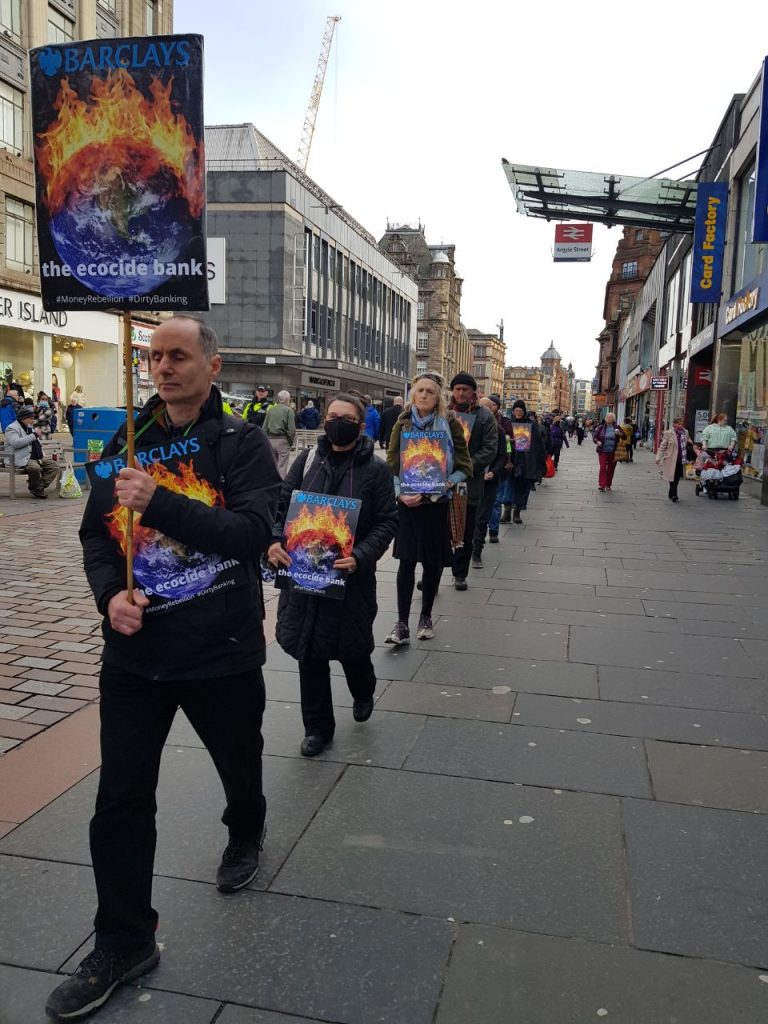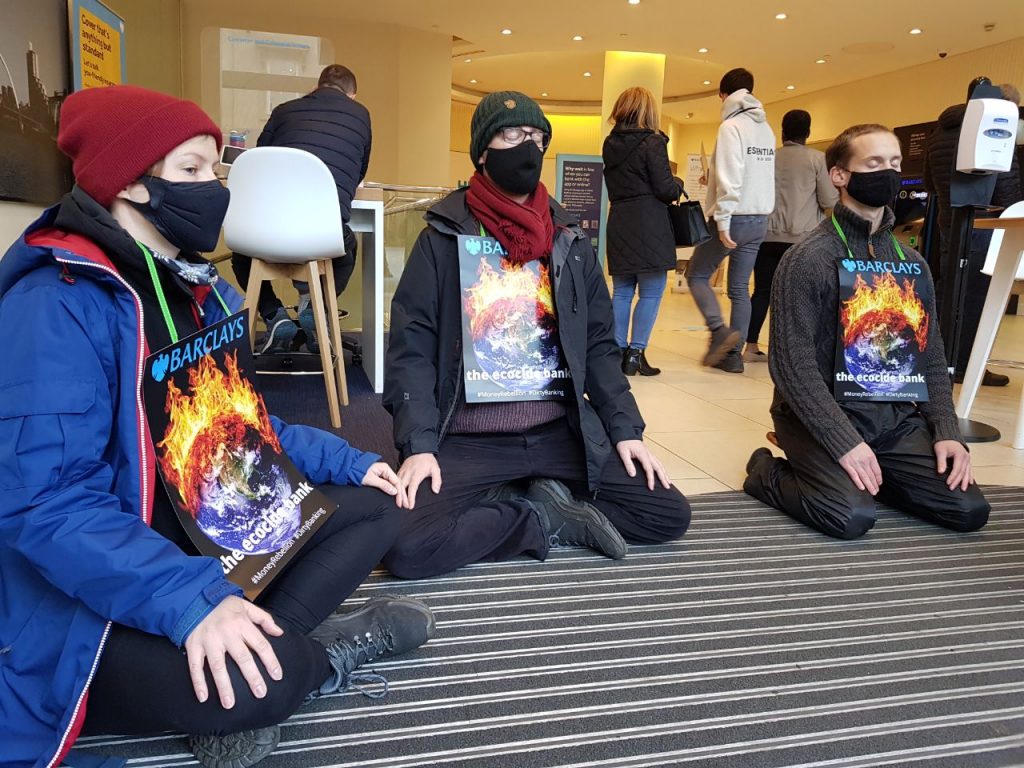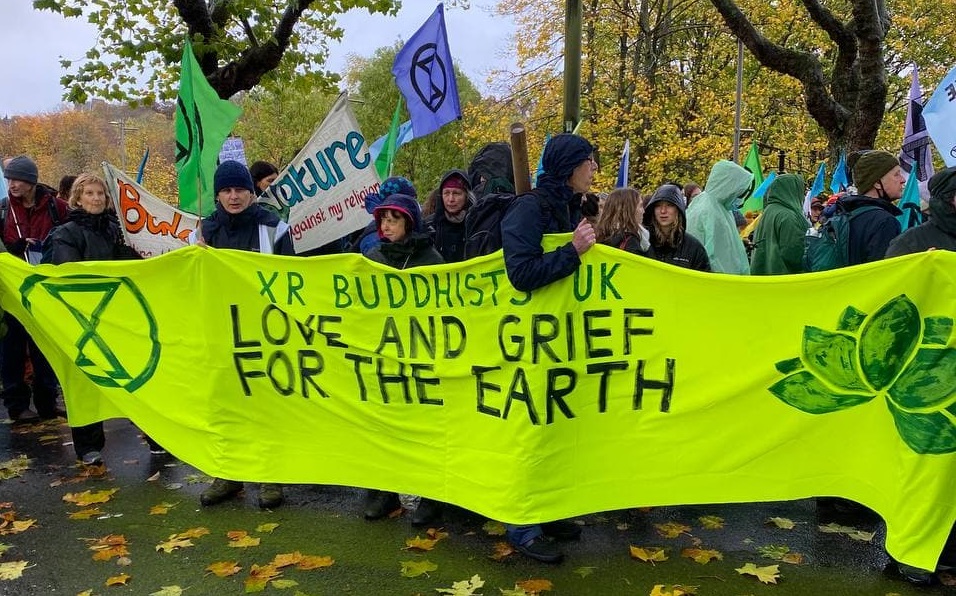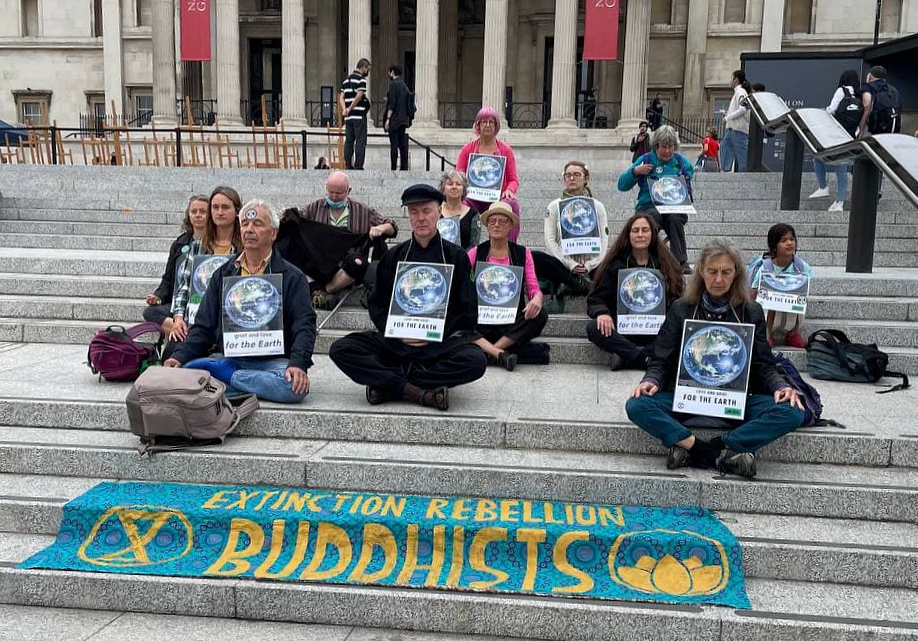Power, Buddhadharma and XR
By Andy Wistreich
Yesterday, while walking along the beach at Studland in Dorset, we were approached by a man who gave us a small piece of flint. ‘Do you know what this is?’ he said and proceeded to explain that after the dinosaurs became extinct, their carcasses etc caused the acidification of the oceans, which led to a proliferation of jellyfish. He said that flint is fossilised compressed jellyfish. The same will happen when we become extinct, he explained.
External power
When we talk about the ‘powers that be’ with respect to this climate and ecological emergency, we mean organisations and their leaders with the power to resolve the crisis. As shown at COP26, they are doing the opposite – enabling things to get worse. This power matrix has various names – ‘the industrial growth economy’, ‘neo-liberalism’, ‘neo-colonialism’, or just plain ‘capitalism’. Regarding the fossil fuel industry, there are corporations who extract fossil fuels, industries that produce the plant and machinery to do this, the massive motor vehicle and aviation etc industries, the road construction industries and many other vested interests.
During XR actions, one of the rebels’ most popular songs has the chorus, ‘Power to the people; people got the power; tell me, can you feel it; it’s getting stronger by the hour.’ This refers to a power not of oppression or exploiting the planet for profit. It’s a shared power. It’s inclusive, equally distributed, and just. It’s revolutionary, because it urges total transformation of the system.
Many people are understandably suspicious of revolutions. Their history isn’t encouraging because they have often led to dictatorship by a strong man who seizes power from the people, with the false promise to manage the chaos that followed the revolution.
So, for many people, ‘power’ has a bad name – it’s being abused now and could be abused in future. A reluctance to address the issue of power sets in, and so, even among activists, an underlying sense of powerlessness prevails. Protests against the existing powers-that-be fall on deaf ears. Burnout and disillusion take over.
However, unless we create a new ecological civilisation, with many features in common with indigenous cultures, with respect to relations between each other and the environment, extinction of ourselves and countless other species follows.
Internal power
In Tibetan Buddhism, enlightenment is sometimes discussed in terms of three deities – Avalokitesvara, Manjushri and Vajrapani. These embody respectively enlightened compassion, wisdom, and power (aka action or skilful means). Vajrapani generally appears as a wrathful deity, with bulging eyes, fangs, upstanding hair and surrounded by fire. He is the ‘Lord of the Secrets’ because he protects secret mantra – the vajrayana. His power is the power of mantra, of wrath, of ritual protection of the Dharma. It is a power that can be terrifying.
When it comes down to it, this power is simply the power of the completely pure mind, cleared of egoistic selfish compulsion –without self-interest or grasping, acting for the wellbeing of everyone. Its fierce aspect deters the ego-empire-building inclinations of those of us bogged down in samsara, who too easily slip into the mode of power-over-others when circumstances allow.
XR Buddhists often speak of the powerful meditations they experience when sitting in meditation in an XR action. There seems to be an effect on those around, when a group of XR Buddhists meditate in public, an effect that grounds the energy in a powerful way. Arguably, this is the internal power of Buddhadharma, manifesting and pervading the space.
Connecting external and internal power
XR’s third demand is for citizens’ assemblies (CAs) to determine how we can get out of the climate and ecological crisis we’re in. The CA is a form of deliberative participatory democracy whereby a group of citizens is randomly selected through a process known as sortition, to deliberate and propose a way forward which is put to a referendum and then carried out. The CA has access to experts who help them understand the causes of the problem being deliberated. Their decisions are made in the interests of everyone.
Deliberative participatory democracy is quite different from the representative democracy that prevails at many levels in so-called democratic countries. Representative democracy has been hijacked by political parties, professional lobbyists and media friends of wealthy elites and has spawned a caste of professional politicians who are skilled liars. Once every four of five years these politicians secure election by promising to solve everyone’s problems, but once in power proceed to shore up the system that creates those problems.
Deliberative participatory democracy enables ordinary people without vested interests to collectively figure out practical solutions to collective problems. Nevertheless, popular power is vulnerable to manipulation, and in the turbulence situation of social transition, the egoic grandiosity of individuals can disrupt its democratic character.
The emerging ecological civilisation will only succeed if it is founded on altruistic compassion and transcendence of such ego-grasping. Therefore, we need Dharma to help us build a positive resilient future society. Dharma offers the possibility of power beyond power – selfless power.
Dual power
Right now, we are in a situation of dual power. On the one hand corporate colonialist capitalism and its political institutions hold the strings of external power everywhere. Simultaneously, there is an emerging global consciousness of the nature and roots of the crisis and the necessity to end consumerism, fossil extraction, ecocide, and inequality. This consciousness is manifesting in diverse forms and movements all over the world. It’s a growing internal power with external forms.
Classically, dual power is a stage in revolutionary transition. As a buddhist, I support a non-violent revolution that isn’t rushed but isn’t afraid to acknowledge the issue of power. This requires a power that starts within, abandons ego-grasping and radiates universal love and compassion – a power that manifests the radical inclusivity of genuine participatory democracy. Radical inclusivity accepts everyone and every part of everyone. In radical inclusivity there is no inequality, exploitation, or social injustice. It holds all beings dear.
This stage of dual power is hard to live through, but it points towards a transformation to come. It is the ‘chrysalis phase’ when the caterpillar of the old civilisation liquifies inside the chrysalis prior to reconstituting as the butterfly of the new civilisation. It has been said that the covid pandemic is the beginning of the chrysalis phase of the 21st century global transition.
It certainly feels like there is a meltdown underway as the old civilisation breaks down. Uncertainty, insecurity, anxiety everywhere – it can feel scary. But meanwhile one may feel a groundswell of determination and courage for change. XR Buddhists sit silently on the ground of this rising energy, at one with the pain and yearning of the world. Thus, we participate as agents in the process.
Power, Buddhadharma and XR Read More »




